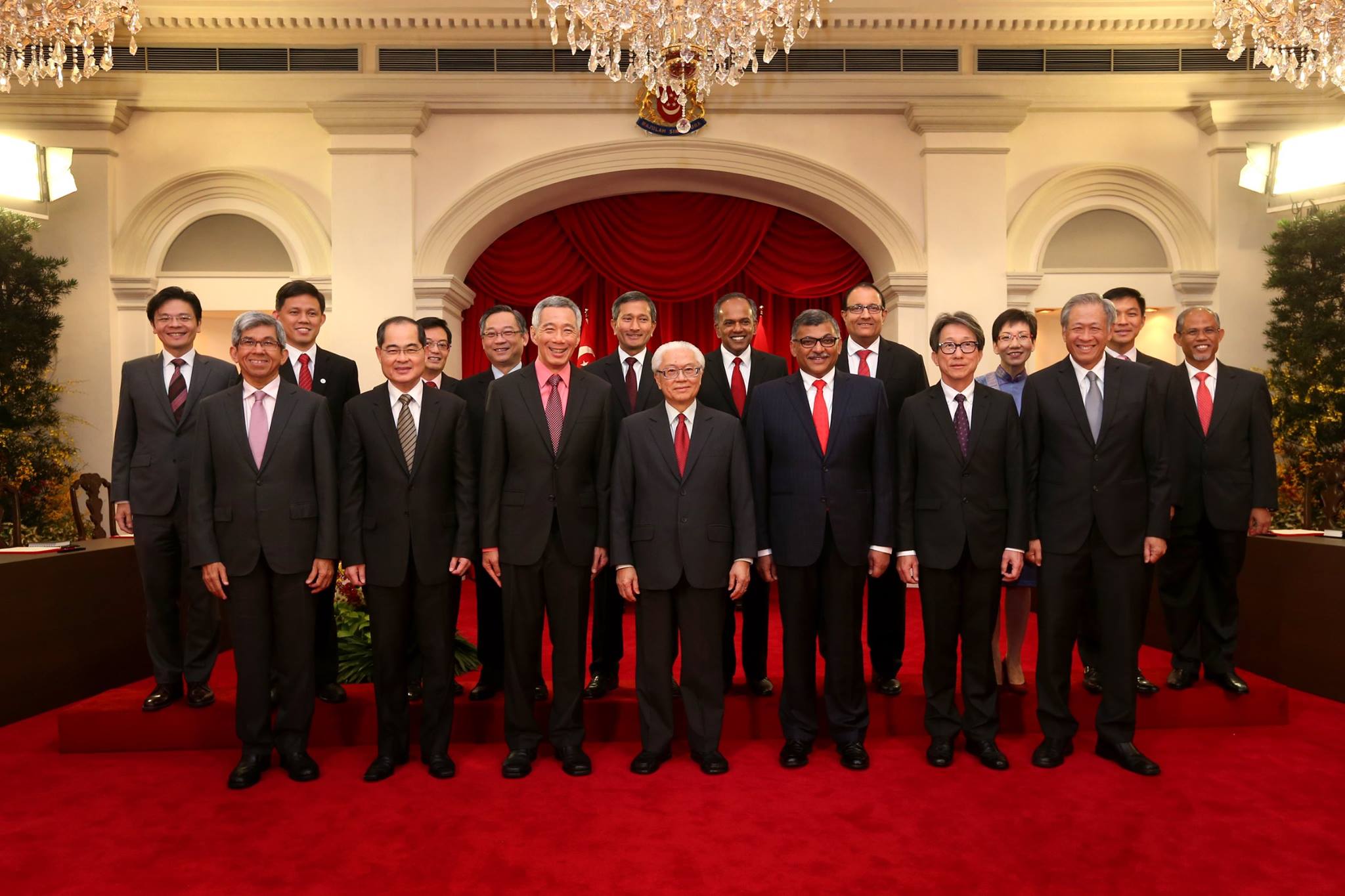Political honeymoons don't last, but there might just be a five-year period of political stability for the fourth-generation leadership of Singapore ministers to find their footing.
Following the People’s Action Party (PAP)'s landslide 69.86 per cent win on Sep 11, international financial daily The Wall Street Journal observed (in "Why Singapore Is a Safe Harbor in Asia’s Economic Tempest") that “the decisive mandate that Singaporeans handed to their long-ruling party last week reinforced the tiny country’s status as a bastion of stability for foreign investment in a region grappling with growing instability".
A week ago, Prime Minister Lee Hsien Loong introduced his new line-up of leaders to take Singapore beyond SG50. The Cabinet was sworn in on Oct. 1 at the Istana, with a total of 31 out of 37 office-holders taking their oaths in front of President Tony Tan.
Here are three things we initially didn't notice after last week's cabinet reshuffle:
1. The emergence of a team of six rivals to be the next PM
With the widespread news coverage of the Cabinet reshuffle, especially with The Sunday Times' analysis on the likely 4th-generation leader who might take over PM Lee, a "Super Six" group has emerged.
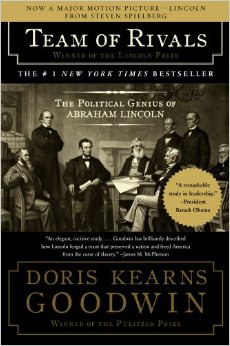 Source: Amazon
Source: Amazon
A bit of context about the "Team of rivals" reference: In 2005, Pulitzer Prize-winning American historian Doris Kearns Goodwin wrote Team of Rivals, a biographical portrait of the 16th U.S. President Abraham Lincoln and three leading presidential rivals who served with him in his cabinet from 1861 to 1865. President Barack Obama praised the "wonderful book" and said that it was a "remarkable study in leadership".
So back to our context: who are these six potential future PMs?
From the Principal Private Secretaries/Senior Civil servants end:
1) Minister for Finance Heng Swee Keat (former PPS to Lee Kuan Yew), 54
2) Minister for National Development Lawrence Wong (former PPS to PM Lee), 42
3) Acting Minister for Education Ong Ye Kung (former PPS to PM Lee), 45
*A PPS is a high-ranking civil servant (as senior as the Deputy Secretary in a Ministry) and runs the Prime Minister or Senior Minister’s private office. This role is similar to the British Civil Service and Australian Public Service.
From the Singapore Armed Forces end:
4) Minister in the Prime Minister's Office and Labour chief Chan Chun Sing (former Chief of Army and Major-General), 45
5) Minister for Social and Family Development Tan Chuan-Jin (Brigadier-General), 46
6) Acting Minister for Education Ng Chee Meng (former Chief of Defence Force and Lieutenant-General), 47
From among this "team of rivals", we will find our next PM and our Deputy Prime Minister who will lead us beyond SG60 and 70.
2. PM Lee used his strong personal mandate in a way that would have been perceived as counter-intuitive in politics in other countries.
In ex-Ang Mo Kio GRC MP Inderjit Singh's 3,700-word analysis on GE2015, he said that "one of the reasons for this (PAP's landslide win) was that PM’s personal popularity increased by 1% to 2%, especially after his lunch-time rally speech at Raffles Place".
And how did PM Lee use the strong personal mandate he was given?
a) He persuaded his influential DPMs to lead by example — to relinquish their powerful portfolios and act as mentors instead
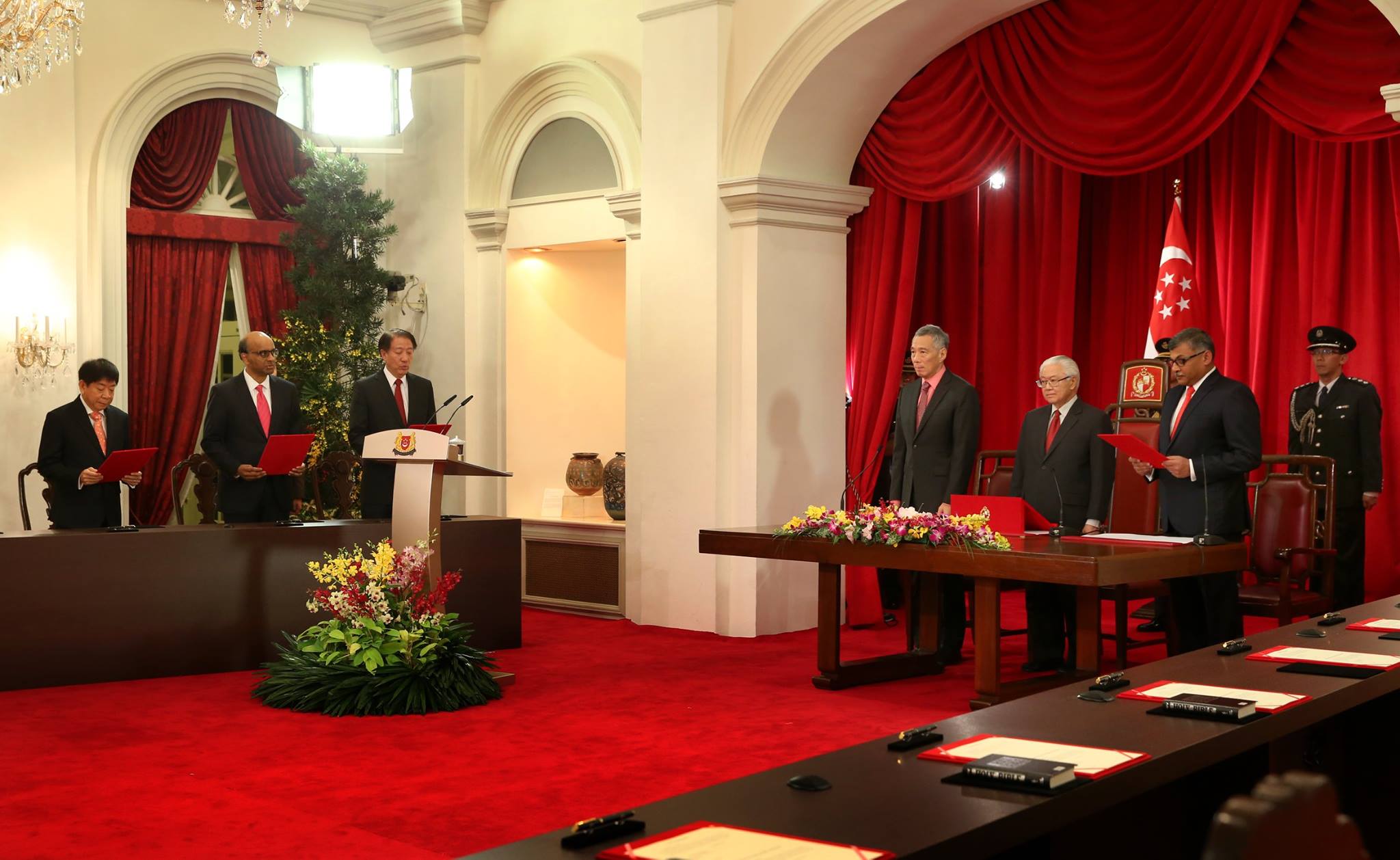 Source: Lee Hsien Loong Facebook
Source: Lee Hsien Loong Facebook
PM Lee said the introduction of coordinating ministers is not new, citing UK's Secretaries of State as an example.
However, it would have been new in UK politics if their PM manages to persuade influential secretaries of state (or "Big Beasts") to relinquish their portfolios at the peak of their powers. One just has to follow the decade-long political drama in the late 1990s between British PM Tony Blair and his Finance Minister (Treasurer and PM-in-waiting Gordon Brown).
But this was what PM Lee did in the cabinet reshuffle. He asked DPMs Teo Chee Hean and Tharman Shanmugaratnam to relinquish their positions as Home Affairs Minister and Finance Minister respectively to focus full-time on their roles as coordinating ministers.
b) He asked a senior Minister to take on the politically unpopular role of Transport Minister
Many Singaporeans know that it is "a thankless job", in the late Lee Kuan Yew's words, to be Transport Minister.
PM Lee must have assessed that it is more politically prudent to send an experienced, problem-solving Minister like Khaw Boon Wan to take on the role, rather than provide an additional opportunity for a fourth generation leader to lead and learn on the job.
This is because a newly-minted fourth-generation leader without a political track record may not be able to recover politically if he or she is perceived to have failed in the Transport portfolio.
Coordinating Minister for Infrastructure Khaw's concluding words in his first blog post dated September 28 as Transport Minister aptly summed up the political selflessness of Singapore's third-generation leaders, as well as PM's persuasion skills:
If my term turns out to be a thankless job, the loss is personal. But if we succeed collectively in transforming the city, the benefits will go to millions of Singaporeans. In such a cost-benefit equation, I will be selfish to say “no” to PM. I just hope that my heart, my own body train, can withstand the stress and do not breakdown.
c) He persuaded experienced Ministers not to retire yet
Some political analysts may have been surprised that none of the existing full Ministers retired in the reshuffle, unlike the first cabinet reshuffles after GE 2006 and 2011.
In fact, Gillian Koh, Senior Research Fellow at the Institute of Policy Studies gave this prediction before the reshuffle:
With GE2015 over, we can expect that at least half of those named above will be placed as Acting Ministers, and the others as junior ministers. Those of Lim Hng Kiang, Lim Swee Say and Dr Yaacob Ibrahim’s vintage may stand down to make way in due course.
During his cabinet reshuffle press conference, PM Lee said,
Meanwhile, I have retained most of my existing cabinet ministers. They will provide steady hands, especially in a more challenging environment, and will play important roles in mentoring the younger ministers. They will help to ensure a smooth and successful transition.
An explanation for this is that PM Lee took on the task of retaining experienced ministers from a position of strength — PM Lee asked them to stay not because they are too powerful to be retired, but because he wanted more mentors to ensure the success of Singapore's fourth-generation leadership.
In other words, PM Lee may be more persuasive than everyone realises — and less conventional than what political observers assume him to be.
3. This team of rivals needs to be a team
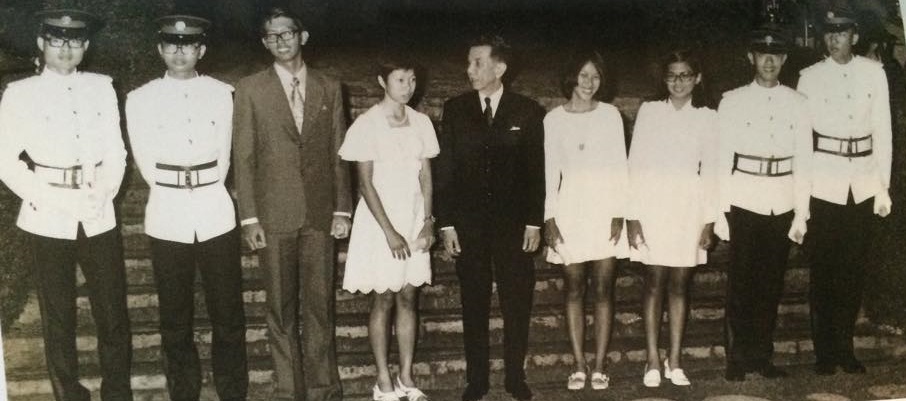 Photo from George Yeo on Bonsai, Banyan and the Tao
Photo from George Yeo on Bonsai, Banyan and the Tao
This was the batch of President's Scholars from the class of 1972.
Three — Teo, former Foreign Minister George Yeo and Trade and Industry Minister (Trade) Lim Hng Kiang — were Singapore Armed Forces (SAF) scholars, with Manpower Minister Lim Swee Say also a scholar with the SAF.
The third generation of leaders first met when they were young and had known each other for many years.
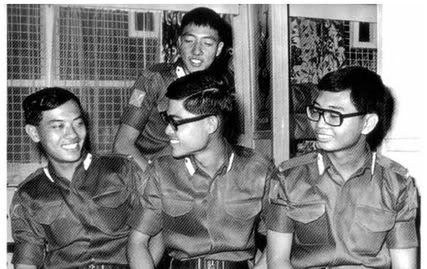 Source: The Singapore Story: Memoirs of Lee Kuan Yew
Source: The Singapore Story: Memoirs of Lee Kuan Yew
For instance, Yeo told Mothership.sg that he met PM Lee at a government chalet in Changi in 1973, saying that "a barbeque had been arranged for our batch of SAF scholars (3rd batch) to meet those from the 1st batch (which included Lee Hsien Loong) before we went to university in the UK".
The personal and working chemistry between the fourth generation leaders may not have started as strongly their predecessors. Many did not spend their formative years growing up together, like the third generation of leaders.
But it is likely that Chan, Tan, and Ng probably worked together in the SAF before entering politics while Heng, Wong, and Ong probably knew each other from the civil service.
But they are, as DPM Tharman puts it, "good men and women" and more than half have been in the Cabinet since 2011.
Hence, it is unlikely that these six PM rivals will end up with factions, like China's taizidang or princelings and the tuanpai or Youth League followers.
However, it is crucial that they gel and work together as a team and do not work as "soloists", even if they have prime ministerial aspirations or ambitions.
As PM observed about his third generation group of leaders during the PAP manifesto launch:
Nothing happens by itself. I have a good team now. But they didn't come in straight away. They are assembled over many years and we have known one another for many years. I am the oldest in the team... Hng Kiang came in 1988, Chee Hean 1991, and then progressively elections by elections until the last election 2011. But actually, I have known them for a very, very long time. Teo Chee Hean and Lim Hng Kiang probably longest — 40-something years. Tharman, also nearly 30 years. Therefore, you know one another, you work to complement one another's strengths and weaknesses, and you make things work for Singapore.
Three weeks ago, Singaporeans gave a strong mandate to the PAP with nearly 70 per cent of the nationwide vote.
A week ago, PM Lee made a bold Cabinet reshuffle, persuading many third-generation leaders to stay on as mentors to the fourth generation.
Singaporeans and our third-generation leaders have given the fourth generation the best chance to succeed and take Singapore forward.
Two centuries ago, Lincoln forged a team that preserved a nation and freed America from the curse of slavery.
Let's hope the fourth generation of leaders can also forge a team that brings Singaporeans together, mobilising them for the greater good, helping to free Singapore from the curse of "normalness", or even mediocrity.
Top photo from Lee Hsien Loong's Facebook page.
If you like what you read, follow us on Facebook and Twitter to get the latest updates.
If you like what you read, follow us on Facebook, Instagram, Twitter and Telegram to get the latest updates.
